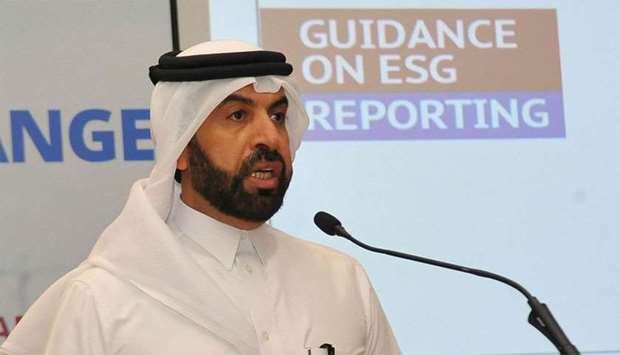The Qatar Stock Exchange (QSE) has strongly pitched for a mandatory ESG (environment social and governance) reporting by the listed companies, which helps investors determine a company’s ability to create value on a sustainable basis.
"We will work with the regulators to make it mandatory for our listed companies to publish their ESG reports," QSE chief executive Rashid bin Ali al-Mansoori told reporters on the sidelines of a seminar MSCI Qatar ESG and Climate Change Forum.
Asked by when it is expected to be mandatory, he said the exchange is in talks with the regulator. As of now, there is no regulatory requirement for ESG reporting, and adherence to this ESG guidance is entirely voluntary.
Also, ESG reporting does not set aside, replace or substitute any reporting obligations of listed companies under existing laws and regulations.
The QSE is among the first stock exchanges in the world to encourage transparency and disclosure by promoting the digitalisation of ESG data.
ESG factors will have an impact on access to capital; revenue growth potential and market access; risks, costs and productivity; brand value and reputation; human capital, employee recruitment and retention, according to the QSE's ESG guidelines.
“Investors worldwide are increasingly incorporating sustainability factors into their investment decisions, and we are convinced that companies that effectively communicate their sustainability strategies will improve their capital raising abilities and have an overall competitive advantage,” al-Mansoori told the seminar.
The surge in global investor interest, combined with the opportunity for improved performance for companies and their investors, were two key reasons why the QSE joined the Sustainable Stock Exchange Initiative (SSEI) in 2016. As part of the SSEI, the QSE released its guidelines on ESG reporting.
In line with SSEI and the World Federation of Exchanges' recommendations, the QSE has developed a set of ESG key performance indicators (KPIs).
Depending on issuer’s business, some of the ESG KPIs are more critical than others, the report said, highlighting that where the environmental impacts and carbon/GHG emissions are crucial for sectors such as hydrocarbons, industrials and utilities, they may be less relevant for financials.
"Issuers should therefore consider expanding on the disclosures on those ESG KPIs that are considered material to their business," the guidelines said.
Globally, the leading advocate of ESG investing is the United Nations Principles for Responsible Investment, which now has more than 2,000 signatories with more than $80tn in assets under management.
Investors worldwide are increasingly recognising the positive relationship between sound ESG performance and an entity's financial performance.
Highlighting that ESG is growing fast worldwide; Raman Aylur Subramanian, global head (equity applied research) of MSCI, said investors have become less tolerant of corporate ESG incidents and that ESG is increasingly being considered as part of fiduciary duty. ESG is financially relevant and that asset owners are allocating to ESG strategies, he added.
"Growing concerns of long term issues such as climate change, demographic changes and inequality, have led both institutional asset owners and retail investors to take action – in particular from millennials," he said, pointing out that more than $180bn has been allocated to MSCI ESG equity and fixed income indices since 2014.


